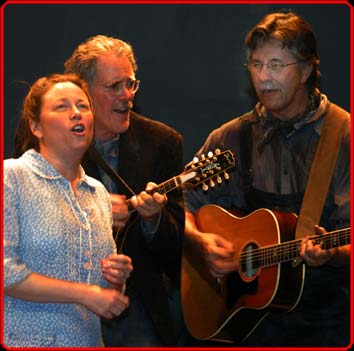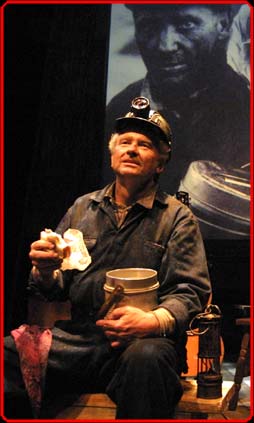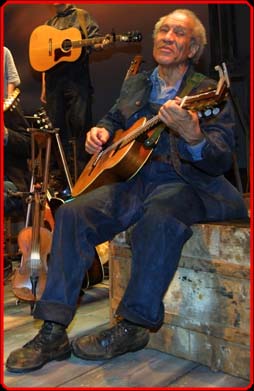
|
||
| Volume II, Issue I | Spring 2003 | |
| Spring 2003 Home Page |
| Culture, Politics & Technology |
| Fiction |
| Music |
| Poetry |
| Theater / Drama |
| About / Contact |
| Archive |
| Current Home Page |
'Fire' creates magic, has hit written all over it
|
You might see 100 concerts this year and never experience anything near the musical spontaneity and magic created every night in the scripted but near-perfect "Fire on the Mountain."
San Diego REP's world-premiere production of the latest musical from the pen of Randal Myler, with music selected and arranged by Dan Wheetman, is equal parts documentary about Appalachian coal miners and celebration of American music.
That it succeeds at both so very well is a testament to the teamwork of Myler and Wheetman, whose earlier collaborations ("Lost Highway," "Ain't Nothin' But the Blues) mined other veins of the American musical experience.

Wheetman is back in town, handling the musical aspects (song selection, arrangements) for and performing in Randal Myler's new production, "Fire On the Mountain," a look at the lives of Appalachian coal miners. "Fire" is currently in its world premiere at the REP (running through the first week of June).
"Randy and I have worked together on one project or another for the last 18 years," Wheetman said by e-mail. "Writing 'Fire' grew out of a lot of different projects, but mostly it came from a play we wrote called 'Appalachian Strings,' a sort of story and song about the people of the Southern mountains. The second act opened with a bit about coal mining and it's impact on the people, the mountains and the culture. We both thought, 'Wow... this is great stuff and would make a wonderful piece by itself.
 Mike Regan in "Fire on the Mountain"
Mike Regan in "Fire on the Mountain" |
| |
 Mississippi Charles Bevel
Mississippi Charles Bevel |
The running time of an hour and a half might seem to be a bit on the short side; but when you spend just over 90 minutes exploring child labor, strip mining, black lung, cave-ins and other hardships endemic to the mining life, well, it's an emotionally full performance.
On the other hand, the above paragraph might give the idea that this is a dour, dark production. And to be truthful, at times it is quite sad. But there are also moments of transcendent joy — and Wheetman's handling of the music always keeps things from ever lagging or getting too heavy. Before then, though, Wheetman was also indirectly involved with getting San Dieagans their first glimpse of bluesman Keb' Mo' as a blues guitarist in the Globe's production of "Lost Highway":
While the story and music are outstanding and are likely to make "Fire" a staple of American theater for decades to come, this first production is particularly noteworthy for the stellar chops of the cast. Singer Molly Andrews is huge in the traditional music world; her clear, bell-like voice is possibly even more pure than that of bluegrass star Alison Krauss. "Mississippi" Charles Bevel has a grounded blues approach that draws on his own Midwestern roots (and reminds us that not all coal miners are white).
Finally, there is Wheetman himself — who takes on the role of lead singer for this run. Last seen in SoCal theater as a minor cast member of "Lost Highway" at the Taper and Globe theaters more than a decade ago, in this production Wheetman is one of the stars. His deep, rich voice is a lot like Randy Travis', but even more traditional in his phrasing and meter — as fans of Marley's Ghost, the band he plays with, well know. You may not have ever heard of Wheetman, but those who've seen him will never forget the performance.Robin Sanford Roberts' set design is ramshackle perfect — the mine entryways frame the screens used to project the photos onto. The rickety wooden staircase and plank floor capture the feeling of a simple, rural locale. Melanie Watnick's costumes are similarly effective at creating a sense of being in Appalachia. Nothing hokey or condescending; they are the simple, worn apparel of people with pride but not so much in the money departmente.
All of it adds up to an evening of pure magic — a show whose pacing and performance are as near to flawless as can be imagined.
Review by Jim Trageser. Jim is a writer and editor living in Escondido, Calif.
![]()
Spring 2003 Theater Section | Spring 2003 Main Page
Current Theater Section | Current Home Page
Copyright © Turbula.net